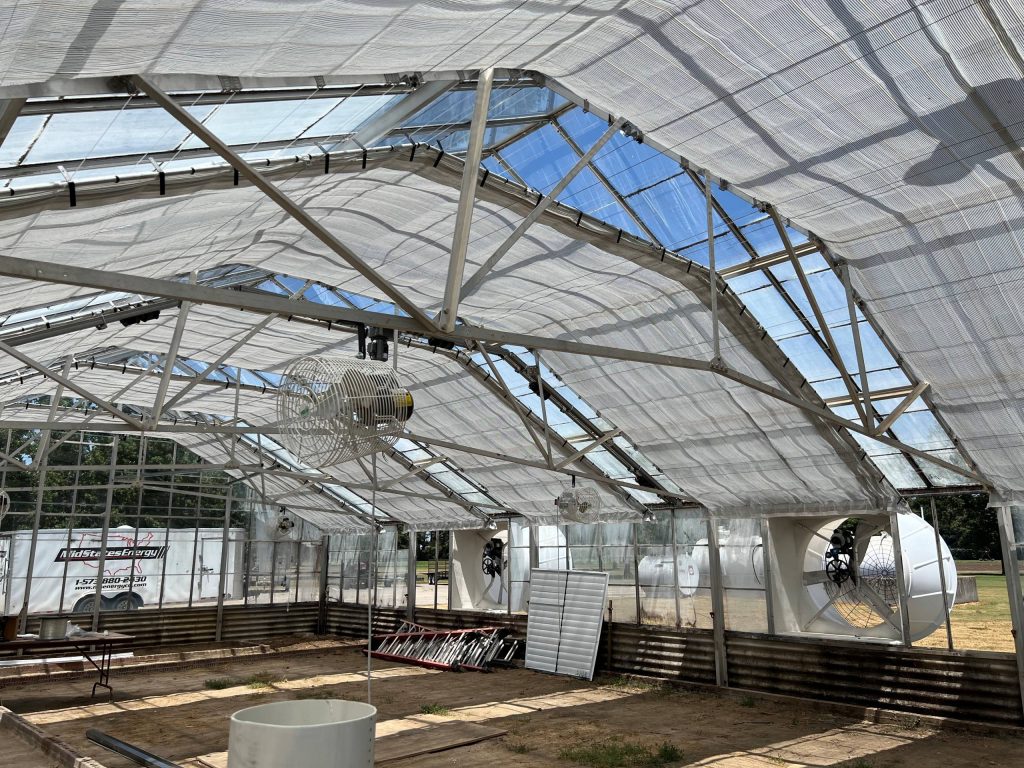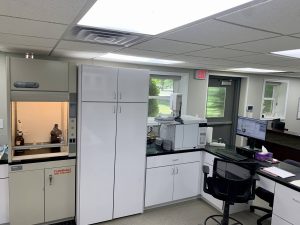Published on
Updated on

This story appears in our MU CAFNR/Agricultural Experiment Station Research Magazine.
The T.E. “Jake” Fisher Delta Research, Extension and Education Center (FD-REEC) facilities include 1,119 acres of land at five locations representing the major soil types of the Bootheel region. Research studies are designed to improve production of crops that are of major importance to the southeast portion of the state; namely soybeans, cotton, rice, grain sorghum and wheat.
The Fisher Delta REEC was established in 1959 in Portageville, Mo., and was created to provide research and educational programs unique to the Missouri Bootheel region.
In addition to a number of new hires to lead the research programs at the REEC, Fisher Delta also has invested in new infrastructure in an effort to continue its research excellence. A newly renovated soybean breeding laboratory and an updated greenhouse facility are the two biggest improvements.
“It is crucial to continue these improvements to enable our researchers to conduct groundbreaking research, and provide farmers and producers with critical knowledge to improve their production practices and bottom line,” said Aaron Brandt, director of the FD-REEC. “This is more important than ever as farmers and producers are continually faced with the task of producing more with less resources, on top of extremely high input costs.”

Brandt, who joined the REEC toward the end of 2021, grew up in Linn, Mo., on his family’s farm. He earned his bachelor’s degree in agricultural business, crop and soil science from the University of Central Missouri, and a master’s in agronomy from the University of Nebraska-Lincoln. Before joining the Fisher Delta REEC, he worked as an agronomic research specialist at Bayer Crop Science based out of Harrisburg, S.D.
“I am so grateful for the opportunity to join the Fisher Delta REEC,” Brandt said. “I am excited to come back to Missouri and I am looking forward to playing an important role in Missouri agriculture.”
Three resident faculty have joined Brandt at the FD-REEC. Justin Chlapecka was hired to lead the rice agronomy research efforts in a new partnership between MU and the Missouri Rice Research and Merchandising Council. Justin Calhoun joined the team as an assistant extension professor in the Division of Plant Science and Technology, as well as an extension state specialist in soils and cropping systems. Finally, Bradley Wilson was hired as an assistant research professor and extension state specialist, where his focus is on developing, funding and conducting field experiments that improve cotton production practices throughout southeast Missouri.
A fourth hire, Chase Floyd, will join the team early next year as a plant protection specialist and assistant professor.
That group joins Jim Heiser (weed science), another Fisher Delta expert who is on-site.
“We have such a great group of researchers at the Fisher Delta REEC, and it’s exciting to add even more expertise to the REEC,” said Shibu Jose, CAFNR associate dean for research and director of the Missouri Agricultural Experiment Station (MOAES). “Resident faculty are incredibly important as we move forward with the new vision for our Missouri Agricultural Experiment Station. It’s definitely an exciting time, especially at the Fisher Delta REEC.”
Researchers at Fisher Delta have gained recognition for developing improved soybean varieties, especially those with soybean cyst nematode resistance. Brandt said the research conducted by the soybean breeding program also focuses on the improvement of yield and resistance to multiple biotic and abiotic stressors, including but not limited to the identification and incorporation of genetic resistance to plant-parasitic nematodes, various pests, and soil-borne pathogens, as well as drought, flood, salt, and off-target dicamba into high-yielding genetic backgrounds.
In addition, substantial efforts are put into enhancing the seed composition of soybean including higher protein and oil contents as well as modified fatty acids (high oleic, low linolenic and high stearic) and carbohydrate profiles (high sucrose, low raffinose and low stachyose).
New updates to the soybean laboratory at the REEC have allowed for expansion for those research focuses. Funding for those improvements came, in part, from the Missouri Soybean Merchandising Council, which works closely with the Fisher Delta REEC.
“An improved laboratory is a vital part of the soybean research conducted at the Fisher Delta REEC,” Brandt said. “It allows for efficient, high-tech research to be conducted on thousands of soybean varieties on over 200 acres of research plots.”
While renovations to the soybean laboratory are complete, updates to the greenhouse space are still ongoing. Funding for the new space was secured through state appropriation due to strong community support. Brandt said the work is vital, as the current greenhouse doesn’t always allow researchers to control every aspect of their projects. Nearly every faculty member at the FD-REEC utilizes the greenhouse.
“The greenhouse updates are extremely exciting for the faculty here,” Brandt said. “It will allow for improved greenhouse studies and expand the length of time studies can be conducted during the year. It will also serve as a potential laboratory for future graduate students at the Fisher Delta REEC.
“These improvements benefit farmers and producers by giving our researchers proper facilities to enable modern research to address modern problems seen in their fields and operations. Through modern and targeted research, our researchers can positively influence production systems locally and beyond.”
The Fisher Delta REEC is finding innovative ways to connect with farmers, too. To help spread the word about the exciting research happening at the REEC, as well as what MU Extension specialists are doing across the state, Calhoun created a podcast to discuss current projects and issues surrounding row crop agriculture in Missouri. Calhoun hosts the MO Crops Podcast, as he invites various guests onto the show to speak on their expertise. Chlapecka and Wilson often join Calhoun on the podcast.
“We’re focused on bringing in individuals from the University of Missouri and the general public who are actively involved in agriculture, especially those in the Bootheel region,” Calhoun said. “We’ve already had a wide variety of guests on the show, and we’re excited to expand on what we’ve built.”